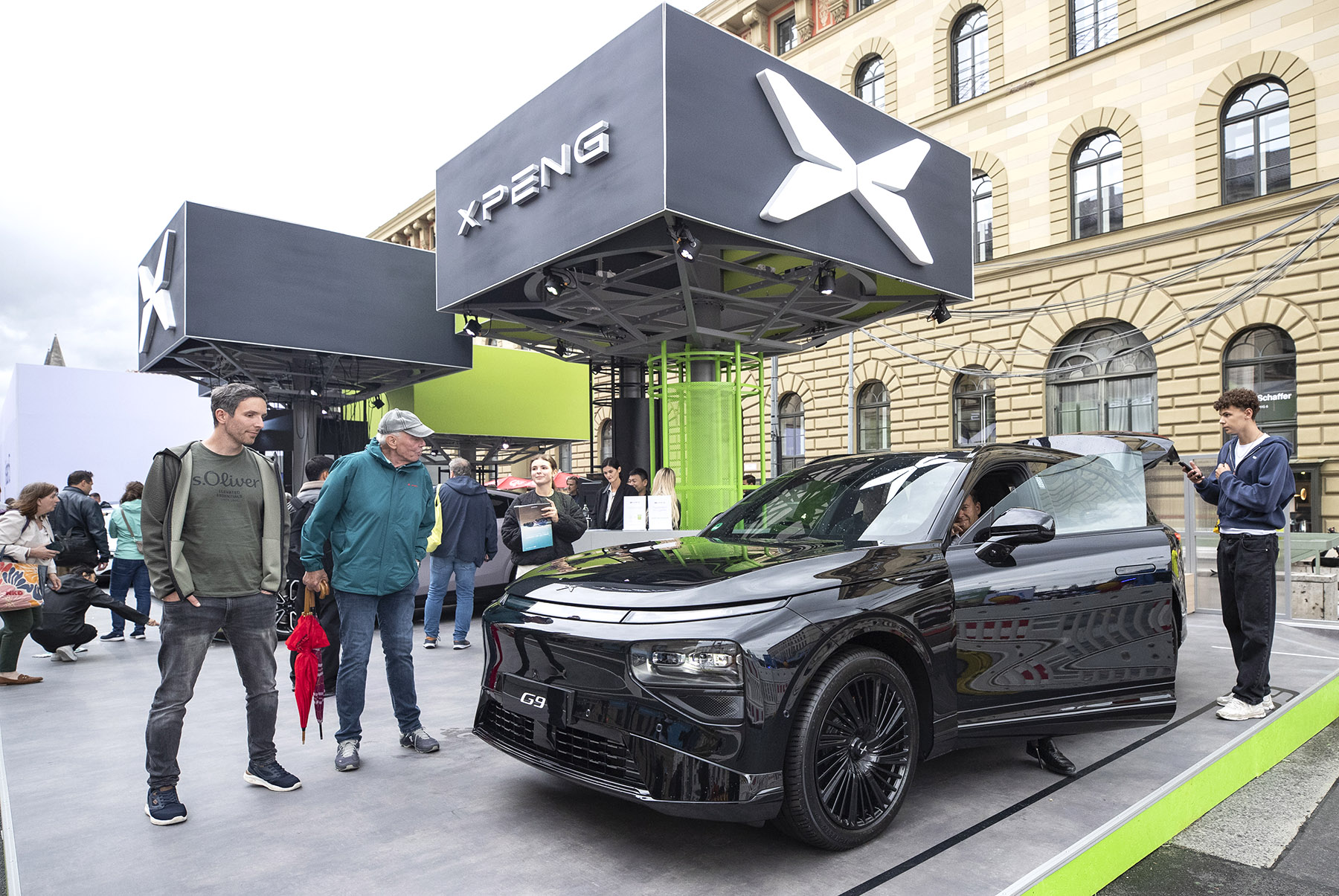NEV launches, factories, and tech strategies expanding local footprint despite trade pressures

Chinese automotive companies showcased their latest products and technologies at IAA Mobility 2025 in Munich, Germany, and announced localization strategies, signaling their determination to strengthen presence in Europe despite challenges such as rising tariffs.
Europe's largest biennial auto event, held from Sept 9 to 14, featured 103 Chinese companies — the second-largest group of exhibitors after German firms — highlighting their latest models and comprehensive supply chain solutions for new energy vehicles, including batteries, chips, and autonomous driving systems.
Among the automakers in attendance, BYD, Chery, Leapmotor, XPeng, Avatr, Hongqi, and Aito each demonstrated their strengths on the exhibition floor.
READ MORE: Chinese battery giant CATL unveils new EV batteries for Europe
BYD not only presented its premium brand Denza and the Seal 06 DM-i hybrid wagon, but also announced via Executive Vice-President Stella Li that it will locally produce all electric vehicles for the European market within three years.
This move aims to better meet local demand and improve supply chain efficiency, Li said.
The company's Hungarian factory is scheduled to begin production this year, with a Turkiye-based facility to follow in 2026.
The first mass-produced model from BYD's Hungarian plant — the European version of the Dolphin — will feature megawatt fast-charging technology, enabling 400 kilometers of range in just five minutes, according to BYD.
XPeng revealed that its first European R&D center will be located in Munich.
Guided by the concept "In Europe, With Europe", the center will explore local user needs, adapt to European regulations, and localize algorithms, while also supporting the establishment of 109 stores in Germany as a foundation for broader expansion across Europe.
XPeng also debuted its new P7 sedan at the event and showcased its other EV models, humanoid robots, and flying cars.
FAW Hongqi outlined its ambitions for Europe, announcing plans to launch 15 electric and hybrid models in 25 European markets by 2028, alongside establishing more than 200 dealerships across the continent within the same timeframe.
The automaker also debuted its EHS5 and will launch the model in Denmark in the fourth quarter of this year.
Leveraging resources from the Stellantis Group, Leapmotor has expanded its reach to over 30 countries and regions worldwide. At the exhibition, the company premiered its new model, the Lafa 5, to the world, while its global model, the B10, was launched in Europe.
According to Zhu Jiangming, CEO of Leapmotor, beyond its partnership with Stellantis, the company is accelerating localization efforts and plans to build a manufacturing plant in Spain.
Battery suppliers such as CATL, Gotion, EVE Energy, and CALB also participated in the exhibition. All four have either set up factories in Europe or are pushing forward with factory construction plans.
Industry leader CATL launched its NP3.0 technology platform and Shenxing Pro — the first lithium iron phosphate battery product integrated with this technology.
CATL has partnered with over 90 percent of mainstream European automakers and established three production bases in Germany, Hungary, and Spain to further strengthen its localized footprint.
In the field of driving assistance systems, Horizon Robotics launched its European headquarters in Munich, while also showcasing its Journey 6 series computing solutions and HSD urban ADAS at the event — underscoring its commitment to Europe.
QCraft, a company specializing in autonomous driving, also used the event to announce its global strategy, revealing plans to set up its European headquarters in Germany and form a partnership with Qualcomm.
In the first seven months of this year, Chinese automakers captured a 15 percent share of the European passenger NEV market — marking a significant jump from 9.2 percent during the same period last year, data from the China Passenger Car Association show.
As local production capacity is gradually released, Chinese automakers are expected to achieve a breakthrough in European market share, shifting from a marginal player to a mainstream force in the industry, industry experts noted.
Zhu of Leapmotor noted that the European Union's 30 percent tariff on EVs, combined with shipping costs, has led to high sales costs for Chinese EVs in Europe. To address this challenge, the company is speeding up localization.
"Tariff barriers will push Chinese automakers to accelerate localized production. As of 2025, five Chinese automakers have announced plans to build factories in Europe, with total investment surpassing 20 billion euros ($21.8 billion). Once operational, these plants will help evade tariff costs and improve the supply chain," said Fu Bingfeng, secretary-general of the China Association of Automobile Manufacturers.
Fu added that this "eco-driven expansion" will help Chinese automakers build long-term competitiveness in the global market. Over the next three to five years, the global footprint of China's auto industry chain will become more comprehensive.
ALSO READ: Chinese EV manufacturers gain strong foothold in South America
For European automakers, the rise of China's NEV industry offers supply chain benefits. By enhancing local R&D and partnering with Chinese companies, they can improve electrification and intelligence, benefiting their European markets.
Sun Xiaohong, secretary-general of the automotive branch of the China Chamber of Commerce for Import and Export of Machinery and Electronic Products, pointed out that the EU's decision to phase out internal combustion engine vehicle production by 2035 and fully transition to EVs creates an opportunity for cooperation between China and Europe.
Sun added that the European auto industry also offers valuable lessons for China in areas such as regulatory frameworks, production systems, mature consumer markets, and cultural frameworks.
Contact the writer at caoyingying@chinadaily.com.cn



